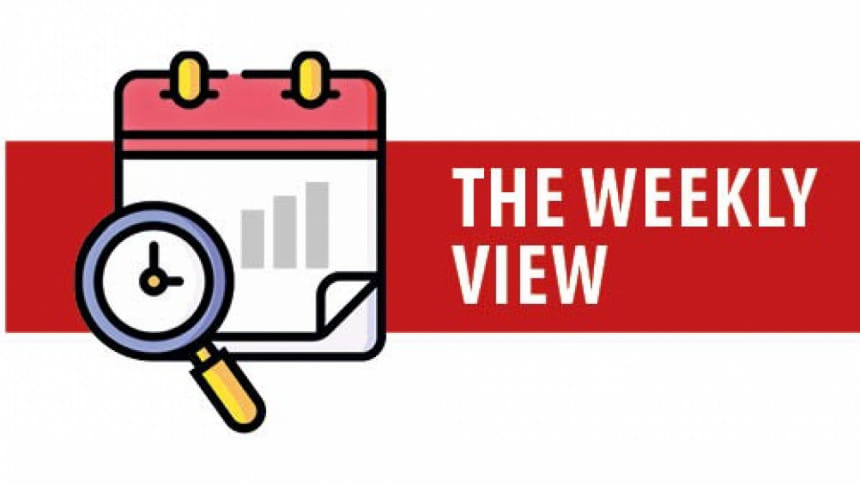Yields on bills and bonds are rising. What does it mean for credit flow to private sector?


Interest of government treasury bills and bonds has been rising gradually since March 2022.
In December last year, the yield of 364-day treasury bills (T-bills) stood at 11.28 percent, the highest in 11 years, against the backdrop of government's borrowing from the financial market, witnessing tightening liquidity supply.
The rising yield of T-bills and bonds, dubbed zero-risk investments, offers a good option for banks for investment as these provide them a cushion from the risk of default.
The increasing yield of T-bills also attracts high-net-worth individuals and corporates.
The reason is the interest rate difference between deposits and T-bills. Until November 2023, the weighted average interest rate on deposits was 8.21 percent while yield of 364-day T-bills was 10.26 percent, according to Bangladesh Bank (BB).
Since then, the interest rate of T-bills rose further as the government's borrowing continued and the central bank maintained its approach to keeping money supply tight to curb inflation, which hovered over 9 percent on average since March 2023.
This raises the question whether the steady spike in the rate amid tightening availability of liquidity will affect credit flow to the private sector.
"It will affect it to some extent," said Emranul Huq, managing director and chief executive at Dhaka Bank PLC.
"Liquidity situation will remain tight as high net worth individuals and corporates are parking their funds in T-bills and bonds," he said.
A head of treasury of a private bank echoed those sentiments, opining that loanable funds of banks will reduce as funds from wealthy persons and firms are moving towards T-bills and bonds.
For banks, this will not be a problem as they will earn from investment in government securities. But credit flow to the private sector will be affected, he said.
Despite the concern, pressure of government's borrowing from the financial systems seems little.
The government plans to borrow nearly Tk 155,400 crore to finance the national budget for FY24, according to a monthly report on government domestic borrowing released by the central bank at the end of January.
However, pressure may build up in the second half of the fiscal year.
This is because of less than required collection of tax. The National Board of Revenue (NBR) collected Tk 165,630 crore in total revenue in the July-December period of the current fiscal year, registering 14 percent growth.
Yet, it fell over Tk 23,200 crore short of the target for the period.
Had it been able to attain the target, the government would have been able to cut bank borrowing to meet public expenditure.
Ahmed Omar Siddique, vice-president and head of investment strategy at CAL Investment Ltd, an investment bank, said in the latter half of FY24, as the government competes for funds from the banking channels to fund its budget deficit, interest rates are expected to rise, posing challenges for private businesses seeking new credit.
However, the impact may vary across different sectors and industries within the economy, he said.
In its macroeconomic outlook for the first half of this calendar year, CAL Bangladesh, a joint venture investment bank, said lending rate is expected to be 15.7 percent by June 2024 because of introduction of the Six Months Moving Average Rate of Treasury (SMART) bills and margin mechanism by the central bank.
"Companies need to prepare for higher borrowing rates," it said.
"Due to narrower spread between the lending rate and treasury yield, banks will have more incentive to invest in the treasury securities than lend to the corporates," added CAL Bangladesh.
Siddique said the inherent lag in the SMART system could dampen banks' incentive to extend credit to businesses, particularly considering the absence of additional provisions required for scheduled banks regarding investments in government T-bills.
For instance, in early February, the lending rate stood at 12.43 percent under the SMART mechanism, while one-year T-bill rates remained at 11.60 percent, resulting in a narrow spread of just 0.83 percent
"This minimal difference offers little incentive for banks to lend to the private sector. Consequently, businesses in general are likely to face hurdles in obtaining credit over the coming months, potentially leading to a slowdown in private sector investment activities," he said.
The spiraling interest of T-bill will have effect on deposit flow too.
"As the interest rate on T-bills keep increasing due to increased borrowing by the government, this will intensify pressure on private and public banks as they will find it difficult to attract deposits," said Ashikur Rahman, senior economist at the Policy Research Institute of Bangladesh.
"Consequently, interest rate in commercial banks must rise if we want deposit growth to not slowdown. The situation needs close monitoring by Bangladesh Bank so that we can adopt any required time-sensitive policy changes."
Sheikh Mohammad Maroof, additional managing director & chief business officer at City Bank PLC, said the authorities are pursuing a tight monetary policy to contain credit growth to the private sector in order to reduce inflation.
He said the government's borrowing may not crowd out funds for private sector loans.
"There is still excess liquidity in the banking sector, and I expect liquidity will remain available in the market too. The question is whether there will be appetite among private sector to borrow at high interest rates," he said.

 For all latest news, follow The Daily Star's Google News channel.
For all latest news, follow The Daily Star's Google News channel. 



Comments